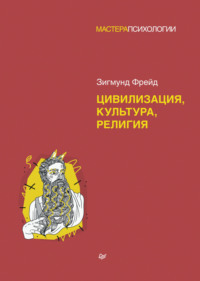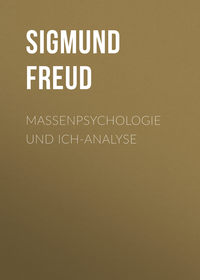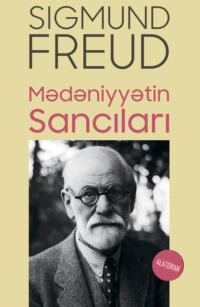 полная версия
полная версияDream Psychology: Psychoanalysis for Beginners
It is, perhaps, not superfluous to support these assertions by examples:
1. A seemingly inoffensive, well-made dream of a patient. She was going to market with her cook, who carried the basket. The butcher said to her when she asked him for something: "That is all gone," and wished to give her something else, remarking; "That's very good." She declines, and goes to the greengrocer, who wants to sell her a peculiar vegetable which is bound up in bundles and of a black color. She says: "I don't know that; I won't take it."
The remark "That is all gone" arose from the treatment. A few days before I said myself to the patient that the earliest reminiscences of childhood are all gone as such, but are replaced by transferences and dreams. Thus I am the butcher.
The second remark, "I don't know that" arose in a very different connection. The day before she had herself called out in rebuke to the cook (who, moreover, also appears in the dream): "Behave yourself properly; I don't know that" – that is, "I don't know this kind of behavior; I won't have it." The more harmless portion of this speech was arrived at by a displacement of the dream content; in the dream thoughts only the other portion of the speech played a part, because the dream work changed an imaginary situation into utter irrecognizability and complete inoffensiveness (while in a certain sense I behave in an unseemly way to the lady). The situation resulting in this phantasy is, however, nothing but a new edition of one that actually took place.
2. A dream apparently meaningless relates to figures. "She wants to pay something; her daughter takes three florins sixty-five kreuzers out of her purse; but she says: 'What are you doing? It only cost twenty-one kreuzers.'"
The dreamer was a stranger who had placed her child at school in Vienna, and who was able to continue under my treatment so long as her daughter remained at Vienna. The day before the dream the directress of the school had recommended her to keep the child another year at school. In this case she would have been able to prolong her treatment by one year. The figures in the dream become important if it be remembered that time is money. One year equals 365 days, or, expressed in kreuzers, 365 kreuzers, which is three florins sixty-five kreuzers. The twenty-one kreuzers correspond with the three weeks which remained from the day of the dream to the end of the school term, and thus to the end of the treatment. It was obviously financial considerations which had moved the lady to refuse the proposal of the directress, and which were answerable for the triviality of the amount in the dream.
3. A lady, young, but already ten years married, heard that a friend of hers, Miss Elise L____, of about the same age, had become engaged. This gave rise to the following dream:
She was sitting with her husband in the theater; the one side of the stalls was quite empty. Her husband tells her, Elise L____ and her fiancé had intended coming, but could only get some cheap seats, three for one florin fifty kreuzers, and these they would not take. In her opinion, that would not have mattered very much.
The origin of the figures from the matter of the dream thoughts and the changes the figures underwent are of interest. Whence came the one florin fifty kreuzers? From a trifling occurrence of the previous day. Her sister-in-law had received 150 florins as a present from her husband, and had quickly got rid of it by buying some ornament. Note that 150 florins is one hundred times one florin fifty kreuzers. For the three concerned with the tickets, the only link is that Elise L____ is exactly three months younger than the dreamer. The scene in the dream is the repetition of a little adventure for which she has often been teased by her husband. She was once in a great hurry to get tickets in time for a piece, and when she came to the theater one side of the stalls was almost empty. It was therefore quite unnecessary for her to have been in such a hurry. Nor must we overlook the absurdity of the dream that two persons should take three tickets for the theater.
Now for the dream ideas. It was stupid to have married so early; I need not have been in so great a hurry. Elise L____'s example shows me that I should have been able to get a husband later; indeed, one a hundred times better if I had but waited. I could have bought three such men with the money (dowry).
III
WHY THE DREAM DISGUISES THE DESIRES
In the foregoing exposition we have now learnt something of the dream work; we must regard it as a quite special psychical process, which, so far as we are aware, resembles nothing else. To the dream work has been transferred that bewilderment which its product, the dream, has aroused in us. In truth, the dream work is only the first recognition of a group of psychical processes to which must be referred the origin of hysterical symptoms, the ideas of morbid dread, obsession, and illusion. Condensation, and especially displacement, are never-failing features in these other processes. The regard for appearance remains, on the other hand, peculiar to the dream work. If this explanation brings the dream into line with the formation of psychical disease, it becomes the more important to fathom the essential conditions of processes like dream building. It will be probably a surprise to hear that neither the state of sleep nor illness is among the indispensable conditions. A whole number of phenomena of the everyday life of healthy persons, forgetfulness, slips in speaking and in holding things, together with a certain class of mistakes, are due to a psychical mechanism analogous to that of the dream and the other members of this group.
Displacement is the core of the problem, and the most striking of all the dream performances. A thorough investigation of the subject shows that the essential condition of displacement is purely psychological; it is in the nature of a motive. We get on the track by thrashing out experiences which one cannot avoid in the analysis of dreams. I had to break off the relations of my dream thoughts in the analysis of my dream on p. 8 because I found some experiences which I do not wish strangers to know, and which I could not relate without serious damage to important considerations. I added, it would be no use were I to select another instead of that particular dream; in every dream where the content is obscure or intricate, I should hit upon dream thoughts which call for secrecy. If, however, I continue the analysis for myself, without regard to those others, for whom, indeed, so personal an event as my dream cannot matter, I arrive finally at ideas which surprise me, which I have not known to be mine, which not only appear foreign to me, but which are unpleasant, and which I would like to oppose vehemently, whilst the chain of ideas running through the analysis intrudes upon me inexorably. I can only take these circumstances into account by admitting that these thoughts are actually part of my psychical life, possessing a certain psychical intensity or energy. However, by virtue of a particular psychological condition, the thoughts could not become conscious to me. I call this particular condition "Repression." It is therefore impossible for me not to recognize some casual relationship between the obscurity of the dream content and this state of repression – this incapacity of consciousness. Whence I conclude that the cause of the obscurity is the desire to conceal these thoughts. Thus I arrive at the conception of the dream distortion as the deed of the dream work, and of displacement serving to disguise this object.
I will test this in my own dream, and ask myself, What is the thought which, quite innocuous in its distorted form, provokes my liveliest opposition in its real form? I remember that the free drive reminded me of the last expensive drive with a member of my family, the interpretation of the dream being: I should for once like to experience affection for which I should not have to pay, and that shortly before the dream I had to make a heavy disbursement for this very person. In this connection, I cannot get away from the thought that I regret this disbursement. It is only when I acknowledge this feeling that there is any sense in my wishing in the dream for an affection that should entail no outlay. And yet I can state on my honor that I did not hesitate for a moment when it became necessary to expend that sum. The regret, the counter-current, was unconscious to me. Why it was unconscious is quite another question which would lead us far away from the answer which, though within my knowledge, belongs elsewhere.
If I subject the dream of another person instead of one of my own to analysis, the result is the same; the motives for convincing others is, however, changed. In the dream of a healthy person the only way for me to enable him to accept this repressed idea is the coherence of the dream thoughts. He is at liberty to reject this explanation. But if we are dealing with a person suffering from any neurosis – say from hysteria – the recognition of these repressed ideas is compulsory by reason of their connection with the symptoms of his illness and of the improvement resulting from exchanging the symptoms for the repressed ideas. Take the patient from whom I got the last dream about the three tickets for one florin fifty kreuzers. Analysis shows that she does not think highly of her husband, that she regrets having married him, that she would be glad to change him for some one else. It is true that she maintains that she loves her husband, that her emotional life knows nothing about this depreciation (a hundred times better!), but all her symptoms lead to the same conclusion as this dream. When her repressed memories had rewakened a certain period when she was conscious that she did not love her husband, her symptoms disappeared, and therewith disappeared her resistance to the interpretation of the dream.
This conception of repression once fixed, together with the distortion of the dream in relation to repressed psychical matter, we are in a position to give a general exposition of the principal results which the analysis of dreams supplies. We learnt that the most intelligible and meaningful dreams are unrealized desires; the desires they pictured as realized are known to consciousness, have been held over from the daytime, and are of absorbing interest. The analysis of obscure and intricate dreams discloses something very similar; the dream scene again pictures as realized some desire which regularly proceeds from the dream ideas, but the picture is unrecognizable, and is only cleared up in the analysis. The desire itself is either one repressed, foreign to consciousness, or it is closely bound up with repressed ideas. The formula for these dreams may be thus stated: They are concealed realizations of repressed desires. It is interesting to note that they are right who regard the dream as foretelling the future. Although the future which the dream shows us is not that which will occur, but that which we would like to occur. Folk psychology proceeds here according to its wont; it believes what it wishes to believe.
Dreams can be divided into three classes according to their relation towards the realization of desire. Firstly come those which exhibit a non-repressed, non-concealed desire; these are dreams of the infantile type, becoming ever rarer among adults. Secondly, dreams which express in veiled form some repressed desire; these constitute by far the larger number of our dreams, and they require analysis for their understanding. Thirdly, these dreams where repression exists, but without or with but slight concealment. These dreams are invariably accompanied by a feeling of dread which brings the dream to an end. This feeling of dread here replaces dream displacement; I regarded the dream work as having prevented this in the dream of the second class. It is not very difficult to prove that what is now present as intense dread in the dream was once desire, and is now secondary to the repression.
There are also definite dreams with a painful content, without the presence of any anxiety in the dream. These cannot be reckoned among dreams of dread; they have, however, always been used to prove the unimportance and the psychical futility of dreams. An analysis of such an example will show that it belongs to our second class of dreams – a perfectly concealed realization of repressed desires. Analysis will demonstrate at the same time how excellently adapted is the work of displacement to the concealment of desires.
A girl dreamt that she saw lying dead before her the only surviving child of her sister amid the same surroundings as a few years before she saw the first child lying dead. She was not sensible of any pain, but naturally combatted the view that the scene represented a desire of hers. Nor was that view necessary. Years ago it was at the funeral of the child that she had last seen and spoken to the man she loved. Were the second child to die, she would be sure to meet this man again in her sister's house. She is longing to meet him, but struggles against this feeling. The day of the dream she had taken a ticket for a lecture, which announced the presence of the man she always loved. The dream is simply a dream of impatience common to those which happen before a journey, theater, or simply anticipated pleasures. The longing is concealed by the shifting of the scene to the occasion when any joyous feeling were out of place, and yet where it did once exist. Note, further, that the emotional behavior in the dream is adapted, not to the displaced, but to the real but suppressed dream ideas. The scene anticipates the long-hoped-for meeting; there is here no call for painful emotions.
There has hitherto been no occasion for philosophers to bestir themselves with a psychology of repression. We must be allowed to construct some clear conception as to the origin of dreams as the first steps in this unknown territory. The scheme which we have formulated not only from a study of dreams is, it is true, already somewhat complicated, but we cannot find any simpler one that will suffice. We hold that our psychical apparatus contains two procedures for the construction of thoughts. The second one has the advantage that its products find an open path to consciousness, whilst the activity of the first procedure is unknown to itself, and can only arrive at consciousness through the second one. At the borderland of these two procedures, where the first passes over into the second, a censorship is established which only passes what pleases it, keeping back everything else. That which is rejected by the censorship is, according to our definition, in a state of repression. Under certain conditions, one of which is the sleeping state, the balance of power between the two procedures is so changed that what is repressed can no longer be kept back. In the sleeping state this may possibly occur through the negligence of the censor; what has been hitherto repressed will now succeed in finding its way to consciousness. But as the censorship is never absent, but merely off guard, certain alterations must be conceded so as to placate it. It is a compromise which becomes conscious in this case – a compromise between what one procedure has in view and the demands of the other. Repression, laxity of the censor, compromise– this is the foundation for the origin of many another psychological process, just as it is for the dream. In such compromises we can observe the processes of condensation, of displacement, the acceptance of superficial associations, which we have found in the dream work.
It is not for us to deny the demonic element which has played a part in constructing our explanation of dream work. The impression left is that the formation of obscure dreams proceeds as if a person had something to say which must be agreeable for another person upon whom he is dependent to hear. It is by the use of this image that we figure to ourselves the conception of the dream distortion and of the censorship, and ventured to crystallize our impression in a rather crude, but at least definite, psychological theory. Whatever explanation the future may offer of these first and second procedures, we shall expect a confirmation of our correlate that the second procedure commands the entrance to consciousness, and can exclude the first from consciousness.
Once the sleeping state overcome, the censorship resumes complete sway, and is now able to revoke that which was granted in a moment of weakness. That the forgetting of dreams explains this in part, at least, we are convinced by our experience, confirmed again and again. During the relation of a dream, or during analysis of one, it not infrequently happens that some fragment of the dream is suddenly forgotten. This fragment so forgotten invariably contains the best and readiest approach to an understanding of the dream. Probably that is why it sinks into oblivion —i. e., into a renewed suppression.
Viewing the dream content as the representation of a realized desire, and referring its vagueness to the changes made by the censor in the repressed matter, it is no longer difficult to grasp the function of dreams. In fundamental contrast with those saws which assume that sleep is disturbed by dreams, we hold the dream as the guardian of sleep. So far as children's dreams are concerned, our view should find ready acceptance.
The sleeping state or the psychical change to sleep, whatsoever it be, is brought about by the child being sent to sleep or compelled thereto by fatigue, only assisted by the removal of all stimuli which might open other objects to the psychical apparatus. The means which serve to keep external stimuli distant are known; but what are the means we can employ to depress the internal psychical stimuli which frustrate sleep? Look at a mother getting her child to sleep. The child is full of beseeching; he wants another kiss; he wants to play yet awhile. His requirements are in part met, in part drastically put off till the following day. Clearly these desires and needs, which agitate him, are hindrances to sleep. Every one knows the charming story of the bad boy (Baldwin Groller's) who awoke at night bellowing out, "I want the rhinoceros." A really good boy, instead of bellowing, would have dreamt that he was playing with the rhinoceros. Because the dream which realizes his desire is believed during sleep, it removes the desire and makes sleep possible. It cannot be denied that this belief accords with the dream image, because it is arrayed in the psychical appearance of probability; the child is without the capacity which it will acquire later to distinguish hallucinations or phantasies from reality.
The adult has learnt this differentiation; he has also learnt the futility of desire, and by continuous practice manages to postpone his aspirations, until they can be granted in some roundabout method by a change in the external world. For this reason it is rare for him to have his wishes realized during sleep in the short psychical way. It is even possible that this never happens, and that everything which appears to us like a child's dream demands a much more elaborate explanation. Thus it is that for adults – for every sane person without exception – a differentiation of the psychical matter has been fashioned which the child knew not. A psychical procedure has been reached which, informed by the experience of life, exercises with jealous power a dominating and restraining influence upon psychical emotions; by its relation to consciousness, and by its spontaneous mobility, it is endowed with the greatest means of psychical power. A portion of the infantile emotions has been withheld from this procedure as useless to life, and all the thoughts which flow from these are found in the state of repression.
Whilst the procedure in which we recognize our normal ego reposes upon the desire for sleep, it appears compelled by the psycho-physiological conditions of sleep to abandon some of the energy with which it was wont during the day to keep down what was repressed. This neglect is really harmless; however much the emotions of the child's spirit may be stirred, they find the approach to consciousness rendered difficult, and that to movement blocked in consequence of the state of sleep. The danger of their disturbing sleep must, however, be avoided. Moreover, we must admit that even in deep sleep some amount of free attention is exerted as a protection against sense-stimuli which might, perchance, make an awakening seem wiser than the continuance of sleep. Otherwise we could not explain the fact of our being always awakened by stimuli of certain quality. As the old physiologist Burdach pointed out, the mother is awakened by the whimpering of her child, the miller by the cessation of his mill, most people by gently calling out their names. This attention, thus on the alert, makes use of the internal stimuli arising from repressed desires, and fuses them into the dream, which as a compromise satisfies both procedures at the same time. The dream creates a form of psychical release for the wish which is either suppressed or formed by the aid of repression, inasmuch as it presents it as realized. The other procedure is also satisfied, since the continuance of the sleep is assured. Our ego here gladly behaves like a child; it makes the dream pictures believable, saying, as it were, "Quite right, but let me sleep." The contempt which, once awakened, we bear the dream, and which rests upon the absurdity and apparent illogicality of the dream, is probably nothing but the reasoning of our sleeping ego on the feelings about what was repressed; with greater right it should rest upon the incompetency of this disturber of our sleep. In sleep we are now and then aware of this contempt; the dream content transcends the censorship rather too much, we think, "It's only a dream," and sleep on.
It is no objection to this view if there are borderlines for the dream where its function, to preserve sleep from interruption, can no longer be maintained – as in the dreams of impending dread. It is here changed for another function – to suspend the sleep at the proper time. It acts like a conscientious night-watchman, who first does his duty by quelling disturbances so as not to waken the citizen, but equally does his duty quite properly when he awakens the street should the causes of the trouble seem to him serious and himself unable to cope with them alone.
This function of dreams becomes especially well marked when there arises some incentive for the sense perception. That the senses aroused during sleep influence the dream is well known, and can be experimentally verified; it is one of the certain but much overestimated results of the medical investigation of dreams. Hitherto there has been an insoluble riddle connected with this discovery. The stimulus to the sense by which the investigator affects the sleeper is not properly recognized in the dream, but is intermingled with a number of indefinite interpretations, whose determination appears left to psychical free-will. There is, of course, no such psychical free-will. To an external sense-stimulus the sleeper can react in many ways. Either he awakens or he succeeds in sleeping on. In the latter case he can make use of the dream to dismiss the external stimulus, and this, again, in more ways than one. For instance, he can stay the stimulus by dreaming of a scene which is absolutely intolerable to him. This was the means used by one who was troubled by a painful perineal abscess. He dreamt that he was on horseback, and made use of the poultice, which was intended to alleviate his pain, as a saddle, and thus got away from the cause of the trouble. Or, as is more frequently the case, the external stimulus undergoes a new rendering, which leads him to connect it with a repressed desire seeking its realization, and robs him of its reality, and is treated as if it were a part of the psychical matter. Thus, some one dreamt that he had written a comedy which embodied a definite motif; it was being performed; the first act was over amid enthusiastic applause; there was great clapping. At this moment the dreamer must have succeeded in prolonging his sleep despite the disturbance, for when he woke he no longer heard the noise; he concluded rightly that some one must have been beating a carpet or bed. The dreams which come with a loud noise just before waking have all attempted to cover the stimulus to waking by some other explanation, and thus to prolong the sleep for a little while.









